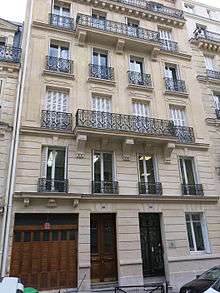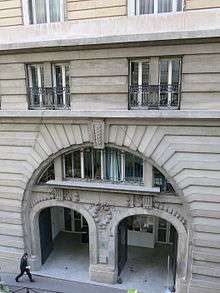International School of Paris
| International School of Paris | |
|---|---|
| Location | |
|
Paris France | |
| Coordinates | 48°51′31″N 2°17′14″E / 48.85865°N 2.28714°ECoordinates: 48°51′31″N 2°17′14″E / 48.85865°N 2.28714°E |
| Information | |
| Type | Day School |
| Religious affiliation(s) | No religious affiliation |
| Established | 1964 |
| Head of school | Mr. Simon Murray |
| Grades | Nursery - 12 |
| Enrollment | around 700 |
| Mascot | Panther |
| Website | http://www.isparis.edu |

The International School of Paris (ISP) is a private international school based in Paris, France.
It was created under the name Pershing Hall in 1964. As of today, it has 700 students, representing over 60 nationalities and 50 native languages. It is the only school in France to offer all three International Baccalaureate programmes: the IB Primary Years Programme, the IB Middle Years Programme and the IB Diploma Programme.
It is accredited by the Council of International Schools.[1]
History
The School, founded by Monique Porter, who wanted an English-speaking school for her young daughter, began in a private building under the name of Pershing Hall in 1964.
Pershing Hall grew rapidly and soon expanded its curriculum from kindergarten to grade 8. Mrs. Jannick Jones, who started the school with Mrs. Porter, was the first Headmistress and gave the basic philosophy to the school. She taught mathematics and French, and at the same time was cooking lunch for the students on a gas stove.

In 1975, the School settled in 96bis rue du Ranelagh and changed its name to the International School of Paris. In 1983, ISP’s middle and high school was moved into 7 rue Chardin. Finally, in 1985, the School expanded into 6 rue Beethoven, which was the former art school of the Musée des Arts Décoratifs, built around 1930.
In 1982 the school became an International Baccalaureate School.[2]
In 1991 the school had 360 students, with the largest group being Americans. In 1992 the student body count was down to 335. At that year the Japanese became the largest group at the school, with 19% of the students. In 1992 Americans made up 15% of the students. In 1992 the annual tuition had risen to 74,750 francs, a 3% increase.[3]
By 2004, the School had 483 students, and was running all three IB programmes (PYP, MYP and IB Diploma). Additional space was needed to accommodate the planned growth to approximately 650 students, resulting in the acquisition of two new buildings: 13 rue Beethoven for the Secondary School, and 98 rue du Ranelagh for the Primary School.[4]
Today, the school enrolls more than 700 students representing over 60 nationalities and 52 languages.
Campuses

The school has two campuses in the 16th arrondissement of Paris. The primary school is on Rue du Ranelagh. The secondary school occupies three buildings in proximity, with two on rue Beethoven and one on rue Chardin.[5]
Accreditation
The school is a non-profit, independent and co-educational establishment. Additionally, it is a fully accredited member of the Council of International Schools (CIS) and the New England Association of Independent Schools (NEAIS).
The school was re-accredited in 2011 by both organizations.
The school is also a member of the National Association of Independent Schools and the European Council of International Schools.
Demographics
In a 2013 interview, Audrey Peverelli, the former director of the ISP, stated that 15% of the students there were local French students, while the percentage was 5% when she started working there.[6] Peverelli stated that possible reasons include a desire for their children to have an international education and a dissatisfaction with the public school system.[6]
Some students are members of Japanese families living in Paris.[7]
Facilities

The International School of Paris is situated on two campuses in the 16th arrondissement of Paris, one on the rue Beethoven and the other on the rue du Ranelagh.
Primary School
The Primary School is housed in two renovated townhouses near the Ranelagh gardens. The houses are united by a playground with a separate section devoted to the youngest students.
In addition to classrooms dedicated to each class group, the Ranelagh campus is equipped with a computer technology lab, an art room, a music room, a library, two classrooms for French and a small gym.
Secondary School
The Secondary School campus (rue Beethoven) is located across the river from the Eiffel Tower. The Beethoven Campus consists of three main buildings (one of which is a renovated art college), and some additional space in neighboring buildings.
The Secondary School is also home to a library with a collection of 10,000 books in more than 12 languages, the most predominant of these being English followed by French, Japanese and Korean. It subscribes to 20 periodicals in French and English and to the online educational database Ebsco. There are 50 computers for students to use for research. Students also have access to the collection of the American Library in Paris at a reduced rate.
In addition to an on-campus gym, the School also uses local athletic stadiums, indoor gymnasiums, basketball courts, swimming pools, and a theater to enhance its P.E. and Arts programs.
The Secondary School is also home to an 18-seat creative arts computer lab with 18 iMacs (21.5 inch screens) featuring Adobe CS5 software. This MAC lab was especially designed for the music, art and design technology students to use in their IB diploma classes.
The School also has its own newspaper club, called the Inquirer. The club covers many different issues, from history to modern day technology, business and electronics.
Holiday Language Program
ISP’s Holiday Language Program (HLP)[8] offers courses in French and English on a weekly basis during the month of July to all students from ISP and elsewhere from ages 3 to 18. Its mission is to motivate students to learn French or English with a fun and interactive program.
Sessions are project-based in order to focus the various activities and fieldtrips around a common theme, which will promote meaningful language acquisition.
The themes are chosen to fit the interests and skill development of each age group and are all taught in French and English. The program includes language classes in the morning adapted to students’ ages and levels of expression in the given language and activities in the afternoon including music, art, sports club, photography and more.
In 2012, one week of HLP cost 445 Euros.
Notable alumni
- Andrea Casiraghi[9]
- Uffie - Dropped out of the school to sign with Ed Banger[10]
References
- ↑ "Aviation students leading the way: J Generic Tabloid Edition." The Courier-Mail, ISSN 1322-5235, 06/12/2004, p. 8. "IN 2003, Indooroopilly State High School became only the third Queensland school to be granted an accreditation by the Council of International Schools. Indooroopilly shares the prestigious accreditation with other schools such as Geelong Grammar, the International School of Paris and the United Nations School in New York."
- ↑ "International School of Paris." International School of Paris. Retrieved on March 1, 2014.
- ↑ Neher, Jacques. "As Multinationals Call in Expatriates, Private Institutions Tighten Their Belts: Recession Pinches Paris-Area School." The New York Times. October 8, 1992. Retrieved on January 3, 2014.
- ↑ "History of the International School of Paris by Monica Porter" (PDF). Retrieved 15 July 2011.
- ↑ "Map and Directions." (Archive) International School of Paris. Consulté le 3 janvier 2014. "Rue du Ranelagh: Primary School" "96 Bis Rue du Ranelagh 75016 Paris, France" et "Rue Beethoven/Chardin: Secondary School/Administration & Admissions" et "ISP's Secondary School is located in three buildings at 6 and 13 rue Beethoven and 7 rue Chardin."
- 1 2 Pilet, François. "«Les parents qui savent ce qu’est une école internationale n’hésitent pas»" (Archive) Le Matin (Switzerland). Sunday 5 May 2013. p. 37. Retrieved on 2 March 2014. "La tendance est la même dans l’école internationale de Paris que je dirige actuellement. Quand j’ai commencé il y a onze ans, il y avait 5% de Français. Cette proportion est aujourd’hui de 15%. Je vois deux raisons à cela: soit ces parents ne sont pas satisfaits du système public, soit ils souhaitent que leurs enfants profitent de l’ouverture que peut leur offrir une école internationale."
- ↑ Conte-Helm, Marie. The Japanese and Europe: Economic and Cultural Encounters (Bloomsbury Academic Collections). A&C Black, December 17, 2013. ISBN 1780939809, 9781780939803., p. 85.
- ↑ "Holiday Language Program". Retrieved 15 July 2011.
- ↑ López, Juan Ramón. "Andrea Casiraghi, un príncipe para un cuento sin hadas." Semana (ES). 11 July 2012. Retrieved on 3 March 2014. "El hijo mayor de Carolina estudió el Bachillerato Internacional en la International School of Paris. Andrea[...]"
- ↑ Edwards, Luke. "Why you need to know Ed Banger Records." FHM. 12 May 2009. Retrieved on 3 March 2014. "The rise to fame also saw Uffie[...] She even dropped out of the International School of Paris to sign with Ed Banger,[...]"
- ↑ "Holiday Language Program". Retrieved 15 July 2011.
External links
| Wikimedia Commons has media related to International School of Paris. |
- International School of Paris
- Virtual Tour of ISP's Facilities
- American Library in Paris
- New England Association of Independent Schools